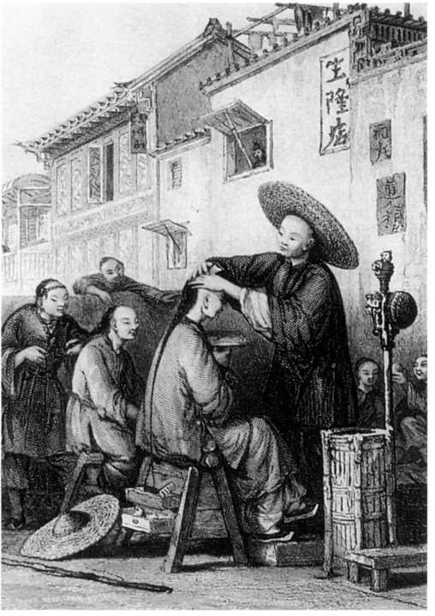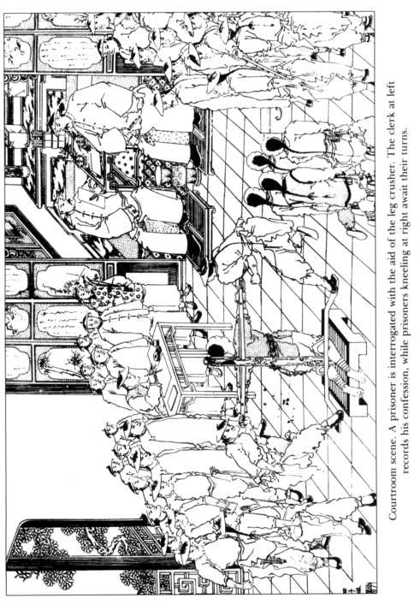Soulstealers: The Chinese Sorcery Scare of 1768 (3 page)
Read Soulstealers: The Chinese Sorcery Scare of 1768 Online
Authors: Philip A. Kuhn

Chu-ch'eng (this was his dharma-name, assumed when he was
tonsured as a monk), aged forty-eight, lay surname Hung, was a
native of Hsiao-shan County. When he was forty-one, after his parents and wife had all died, he entered a temple in Hangchow called
Ch'ung-shan-miao, where he assumed the tonsure.13 There he shared
a teacher (master, shih-fu) with the younger monk Cheng-i, and the
two addressed each other, in the conventional clerical "family" way,
as elder and younger brothers. Chu-ch'eng had not, however,
reached the next stage of monastic life, that of ordination. Because
his temple had no means of supporting him, he went begging in his
native county, where we now find him.
Cheng-i, twenty-two, a native of Jen-ho in Hangchow Prefecture,
lay surname Wang, was Chu-ch'eng's "younger brother." Because he
was a sickly child, his mother had him tonsured at the age of nineteen
at the God-of-War Temple outside the city gate. He later studied
alongside Chu-ch'eng at Hangchow, but like him did not receive
ordination. He joined his "elder brother" to go begging across the
river in Hsiao-shan.
Ching-hsin, aged sixty-two, was from the Grand Canal city of Wu-
hsi in Kiangsu Province; his lay surname was Kung. At the age of
fifty, after his parents, his wife, and his children had all died, he
journeyed to Hangchow to take the tonsure at a small Buddhist
retreat, where he then resided. Later he was ordained at the monastery called Chao-ch'ing-ssu. In the course of his travels to study at
various monasteries, he met the monk called Ch'ao-fan, whom he
later invited to join him as his junior acolyte.
Ch'ao-fan, forty-three, from poor and mountainous T'ai-p'ing
County in Anhwei, lay surname Huang, was Ching-hsin's acolyte. He
had been tonsured at eighteen at a local temple. Later he received
ordination at the Tzu-kuang-ssu monastery, whose location is
unknown but was probably in Hangchow. He went to live with Chinghsin in 1756.
The great cultural and religious center of Hangchow had attracted
all four: two had forsaken lay life because family deaths had left them
alone at what in eighteenth-century China was considered old age.
Two had been tonsured in youth: one because of sickness (an eco nomic liability to his family), and the other for reasons unknown.
Two bore the government-mandated identity papers (ordination certificates) and two did not. Now all four were pursuing the most
common outside occupation of monks: begging. Apart from the spiritual benefits of begging (a demonstration that they had renounced
worldly concerns), their monastic homes lacked the means to support
them. We do not know exactly the extent of the catchment basin of
Hangchow mendicants, but Hsiao-shah was right across the river
from the city, and at the teahouse the four decided to set forth
together there the next day. Chu-ch'eng and the elderly Ching-hsin
would spend the day begging in the villages, while the juniors would
carry everyone's traveling boxes to the old God-of-War Temple near
the west gate of Hsiao-shan City.

A wandering Buddhist monk, in an eighteenth-century
Japanese impression gleaned from Chinese merchants at
Nagasaki. The stubble of hair betrays a degree of
indiscipline that would not have been tolerated at
an established monastery.
Making their way along a village street, Chu-ch'eng and Chinghsin saw two boys, aged eleven or twelve, playing in front of a house.
One saw Chu-ch'eng's name inscribed on his bronze begging bowl
and, to the monk's surprise, recited the ideographs aloud. "So, Mr.
'Official'-you can read!" chuckled the delighted monk. "You study
a few more years and you'll certainly get an official post. What's your
name? After you've become an official, don't forget me," he added,
hoping to please the youngster so he would fetch his parents from
the house to give alms. The boys paid no attention. Seeing no adults
around, the monks gave up and resumed their progress.
A few minutes down the road, a frantic couple came running up
behind them. "Why did you ask our child's name?" they wailed.
"You're a soulstealer!" Once a sorcerer knew a victim's name, who
could say what incantations he could work upon it? Chu-ch'eng
explained that they had come only to beg. "What's `soulstealing' about
saying a few words to your child because he could read?" Agitated
villagers quickly crowded around. Some had learned that these
days "soulstealers" were coming around from far places, casting spells
on children so that they sickened and died. "These two are bad eggs
for sure!" The mob, angrier than ever, tied them up and searched
them roughly. Finding nothing, they began to beat them. As the
hubbub drew a larger crowd, some shouted "burn them!" and others,
"drown them!"
In the crowd was a local headman who managed to quiet the
furious peasants but shrank from handling so serious a matter himself. He therefore took them to the imperial post station (the nearest
agency of the official establishment) to be questioned. The monks were searched again, but no proof of soulstealing could be found.
(What would such proof consist of? Books of sorcery? Tools of
magic?) Just to be sure, the literate child was brought in, inspected,
and found to be in good health. Nevertheless the distraught parents,
trusting in the omnipotence of the written word, demanded that the
post-station clerk draw up a formal document stating that all was
well. This responsibility the clerk was unwilling to assume. Instead,
he wrote up a memorandum for the county authorities. Soon the
magistrate's attendants came to haul Chii-ch'eng and Ching-hsin
away to the fearsome county yamen of Hsiao-shan. There the two
monks found that their companions, too, had been arrested and had
been interrogated under torture.
It was persistent rumors of "soulstealing" that had brought Cheng-i
and Ch'ao-fan to grief. In surrounding counties, public fears were
running high. In Hsiao-span, Ts'ai Jui, a county constable (pu-i), had
been instructed by his superiors to arrest "vagrant monks" from
outside the county who might be responsible for "clipping queues."
A sorcerer with the right "techniques" could say incantations over
the hair clipped from the end of a man's queue and so extract the
soul of its former wearer.
Lurking in the background, unmentioned by anyone connected
with the monks' case, was the political meaning of hair: the queue,
worn behind a shaved forehead, was the headdress of China's
Manchu rulers. It was also universally prescribed, on pain of death,
to be worn by Han Chinese males as a symbol of allegiance to the
ruling dynasty.
Patrolling outside the city's west gate, constable Ts'ai heard streettalk that two monks from "far away" with strange accents were
lodging in the old God-of-War Temple. As Ts'ai later reported to
the magistrate, he then entered the temple and began to question
Ch'ao-fan and Cheng-i. Getting no satisfaction, he began to search
their baggage. From Ch'ao-fan's he pulled clothing, a bronze begging
bowl, clerical robes, and two certificates of ordination. In Chii-
ch'eng's, which he had to break open with a stone, he found three
pairs of scissors, a pigskin rain-cape, an awl, and a cord for binding a
queue.
An excited crowd gathered. "What's a monk doing with this kind
of stuff?" These fellows must be up to no good. There were cries of
"beat them up" and "burn them!" Constable Ts'ai, as he continued
in his report, summoned his courage and told the mob to keep out of this; since Ch'ao-fan was a "real monk" (as shown by his certificates)
there was no basis for arresting him. Cheng-i, however, not only
lacked an ordination certificate (meaning he was only a novice, a
status readily obtainable) but also had with him Chu-ch'eng's traveling
box and its suspicious contents. Bound in chains, the young monk
was taken off to the yamen. Ch'ao-fan found his way to the yamen
to lodge a protest, but was then arrested himself and brought with
the others before the magistrate.

The queue and the shaved forehead. At a barber's stall, a man is having
his forehead shaved in the prescribed manner.

In the great hall, Chu-ch'eng and his companions, chained hand
and foot, knelt before the county magistrate, who sat at his high desk
flanked by his judicial secretaries.'' The questioning began: "How
many queues have you clipped?"
The terrified Chu-ch'eng protested that he had clipped none. The
magistrate then presented Chu-ch'eng with the evidence constable
Ts'ai had brought in: four pairs of scissors, one cord for binding a
queue, and two short pieces of braided hair. "Are these, or are they
not, evidence of your queue-clipping?" Chu-ch'eng answered that
three of the scissors had belonged to his dead son, who had been a
leather-worker. The fourth he knew nothing of. The queue-plaiting
cord had, he said, been used to bind his hair in the days before he
had taken vows and shaved his head. Afterward, he had no use for
it but kept it with his gear. For the braided hair, he offered no
explanation.
An unsatisfactory confession, this, from a prisoner whose guilt was
presumed in advance. Now began the customary courtroom torture.
Attendants dragged Chu-cheng over to the chia-kun, or "pressing
beam." We are not told whether this was the regulation ankle-press,
a device for crushing the ankles by slow degrees, or an equally fearsome instrument that inflicted multiple fractures of the shinbones. A
nineteenth-century observer describes the ankle-press as "a sort of
double wooden vice" consisting of three upright beams, of which the
outer two functioned as levers:
The chief torturer gradually introduces a wedge into the intervals,
alternately changing sides. This mode of forming an expansion at the
upper part, causes the lower ends to draw toward the central upright,
which is fixed into the plank, by which the ankles of the victim are
painfully compressed, or completely crushed. Should the unhappy sufferer be resolute from innocence, or obstinate from guilt, and submit
to the consummation of the horrid procedure, his bones are ultimately
reduced to a jelly.'
Overwhelmed by the pain, Chu-ch'eng eventually declared that all
charges against him were the truth. Still the magistrate was not satisfied, because the agonized monk's story was not sufficiently
coherent. Twice more the chia-kun was tightened, but with no better
result. Ching-hsin now underwent the same torments. After three
days, the magistrate had something resembling admissions of guilt
from all four monks. The maimed prisoners were sent, probably in
the regulation wheeled boxes used for transporting prisoners, some
twenty miles eastward to the Shao-hsing prefectural yamen, the next
rung in the official ladder, and again interrogated. This time, since
Chu-ch'eng's bones were already broken, the presses were not used.
Instead, his lips were slapped ten times with a wooden switch. Cheng-i
was again subjected to the chia-kun. Ching-hsin and Ch'ao-fan were
by this time seen as less promising culprits and were spared further
torture.
By now the testimony was more confused than ever, and the pris oners were sent on up the ladder: this time to their final place of
torment, the provincial judge's yamen in Hangchow. There something surprising happened.